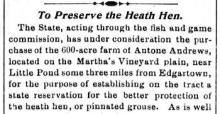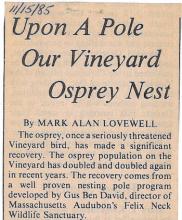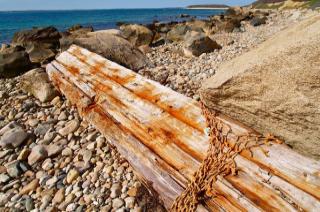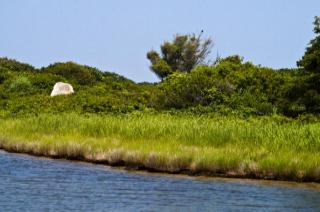Conservation
2012
From a failed heath hen reservation to a red pine plantation gone wrong, the Manuel F. Correllus State Forest has weathered its share of management experiments.
In 2012, the forest’s plants and trees can breathe easy, as the forest recently has been designated as a state reserve by the Massachusetts Department of Conservation and Recreation (DCR).
David Foster, Harvard University forest director and historian for the Correllus state forest, said the designation has guaranteed a better future of the forest.
The place names are familiar and unchanging: Wasque, Cape Pogue and Long Point, Herring Creek Farm, Cedar Tree Neck and Fulling Mill Brook, Waskosim’s Rock and Pecoy Point, to name a few.
But the people who admire, use and could potentially contribute to the thousands of acres of land in conservation on the Vineyard have changed, and Island conservation leaders say this is what frames their biggest challenge today.
2011
The world’s oceans need protection, a globe-traveling National Geographic underwater photographer told a large audience at the Tabernacle last Saturday.
After 35 years of photographing the oceans, Brian Skerry, 49, said he is troubled by growing evidence of degradation of habitat and the waste and loss of sea life. “I think the oceans are dying a death of a thousand cuts,” he said.
Sheriff’s Meadow Sanctuary, the Edgartown property that gives its name to the Island’s largest private landowner and conservation group, is slated for restoration.
Adam Moore, executive director of the Sheriff’s Meadow Foundation, said at the foundation’s annual dinner this week that more than $300,000 of the $500,000 needed to refurbish and maintain the 20-acre property for public use has already been raised, and the foundation is actively seeking the balance from friends and neighbors.
It’s not surprising that Edo Potter’s favorite piece of conservation land is the next one. For decades she has been instrumental in acquiring plot after plot on her beloved Chappaquiddick for public use and enjoyment by future generations. She’s confident about the future of conservation on Martha’s Vineyard because of the health of the Island’s numerous environmental groups and their remarkable track record, both of which owe in large part to her tireless efforts.
A bill which has been quietly making its way through the state house could dramatically affect the future ownership of some of the Vineyard’s pristine barrier beaches, moving them from private hands to public.
The bill, which consists of just a single paragraph, relates to the barrier beaches that separate the Island’s Great Ponds from the ocean. Many of these beaches are privately owned and also are retreating into the ponds as they are eroded on their seaward side.








